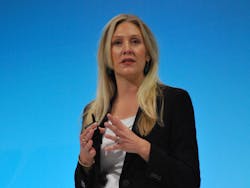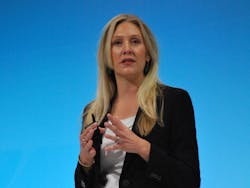Finding success in a post-pandemic world
The COVID-19 pandemic has impacted the way we live and work. Now, nearly three years on, industrial operations are facing challenges both new and enhanced as the world makes major shifts in the way people are working and expectations of consumers and stakeholders change rapidly.
“The challenges all of us were experiencing prior to the pandemic, particularly the lack of access to skilled workers, has only become more pronounced over the past two years,” said Tessa Myers, senior vice president of intelligent devices at Rockwell Automation. Myers was one of the featured speakers during the Perspectives thought-leadership session held this week at Chicago’s McCormick Place in the run up to Automation Fair.
“When I started a lot of what we focused on was lean manufacturing. It was a wonderfully simple time for manufacturers,” Myers told the audience. “All of us had the playbook for what it took to drive improvements in our operations, but that’s not the case today.”
While the pandemic may have accelerated expectations it also opened up opportunities and set examples of what can be accomplished by manufacturers.
Myers pointed to successes such as the rapid production of vaccines and the acceleration in construction of new facilities in response to needs for things such as masks during the pandemic as shining examples of new ways of addressing the industrial environment post-pandemic.
“We are all living in what is a rapid changing workplace,” she said. “Here’s the good news: We’ve never been more well equipped and more enabled to succeed by the technology we have to leverage. The companies that come out on top and realize their full potential are those focused on building agility, resiliency and sustainability in their operations. Not only can we work differently, but time gives us the opportunity to work better.”
To get there, Myers said she sees three trends being adopted in industry to “power growth for what’s next.” Those trends include the transformation of production logistics to adapt quickly to changes in production needs, producing locally for rapid order fulfillment and embracing data-driven sustainability efforts.
Transforming production logistics
In the past, the way industry dealt with spikes in production needs was to throw people at the problem, according to Myers. With the workforce woes trending in the sector, as it is with many industries, that’s not an option anymore.
As several other speakers noted throughout the week at the event, Myers said, “We need to reconsider how goods move through the plant to be able to handle a wide variety of product with the least amount of work.”
Cue the technology. Rockwell Automation boasts products enabling “hundreds of thousands of configurations with thousands of flavors,” Myers continued. In short, automation technology is ready to fill the void left by the lack of a qualified human workforce.
Among the solutions available is independent cart technology, which is designed to change the way products move through plants. Myers said the technology has proved to boost customer efficiency and increase throughput by up to 50%.
Myers also pointed out that the barriers for integrating robotics into the plant floor have been lifted. She showed that unified robotics allows for one control platform for motion and robotics.
“Historically, integrating robotics and other mechatronics into systems was pretty arduous and time-consuming. You needed very specialized skill sets, multiple hardware platforms,” she said. “We’ve been focused on building kinematic control in our logics controllers, and I’m excited about the unified approach to systems design.”
Myers discussed Rockwell Automation’s partnership with robotics company Comau Robotics. The two companies launched a unified robotics solution at Automation Fair this week.
Producing locally
Construction of new manufacturing facilities in the U.S. alone has grown 116% over the past year, Myers said. She considers that great news, especially considering the growing need for rapid deployment of product by manufacturers in the post-pandemic world.
“In order to stay competitive, companies are moving to be more local,” Myers said. “They are gaining proximity to their customers and building resiliency in their supply chain.”
She added that it is vital to maintain resiliency and simplification in rapid asset deployment. “We’ve been driving technology developments over the last few years that are really enabling companies to rapidly deploy automation and process systems in their facilities around the world,” Myers said.
She highlighted the new FLEXHA 5000 I/O, a fully configurable input/output platform—any point can be discrete, analog or HART—built for the requirements of process applications. She said it cuts programming time by 50%. Myers also highlighted the company’s Armor PowerFlex drives, which requires fewer manual connections and speeds installation.
She also touted Rockwell’s investment in its digital engineering tools, which she said enable customers to test, design, refine and improve every aspect of an automation design before moving into production. The result, she said, has been a reduction in system engineering of 30% for electric vehicle battery manufacturer Hirata.
Data-driven sustainability
For all the talk around net-zero goals, less than 25% of all companies are on track to meet their sustainability goals, according to Omdia Partners.
Considering the requirements of stakeholders around sustainability, there’s a lot of work yet to be done. Myers said help lies in the data.
“I think what’s really important is that sustainability efforts have to be data driven,” she said. “We’ve been investing in our intelligence device portfolio, we’re not just enabling agility, rapid deployment and new ways to automate equipment. We’re really investing in an infrastructure that’s going to provide the data that’s needed to drive resiliency and sustainability through the improvement of operations and processes.”
She added that the connectivity capability of devices across the entire portfolio is the core of digital transformation. Data starts at the devices, and it’s critical to connect those data sources together to provide insights to all customers.
“I think what’s critical is an integrated system, hardware and software working together, to drive true value,” Myers added.
Myers said the oil and gas industry is “probably under the most pressure” when it comes to sustainability. Rockwell Automation recently worked with an oil producer in the Permian Basin of West Texas to reduce its greenhouse gas emissions by 50% by leveraging a connected device platform, according to Myers.
She said it was a classic example of industry not only working differently, but working better.
Get the best of Automation Fair 2022
When the event comes to a close, the best, most important coverage will be compiled into a report. Register now to pre-order the report and be among the first to receive it in your inbox.
About the Author

Leaders relevant to this article:


